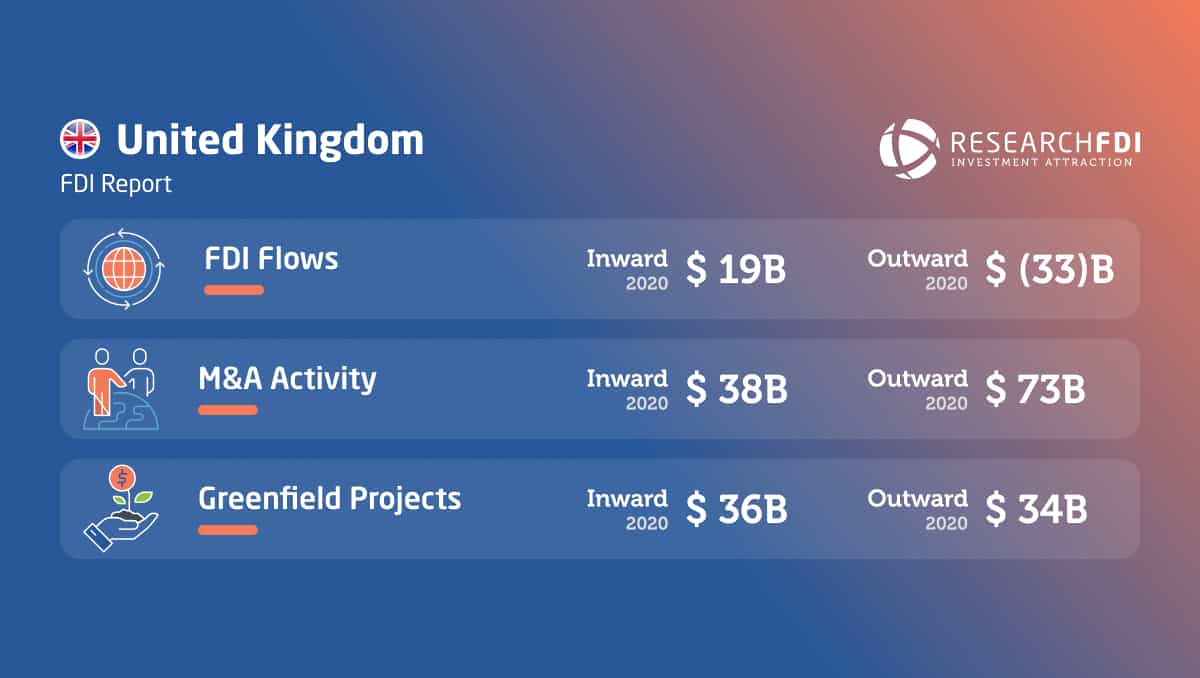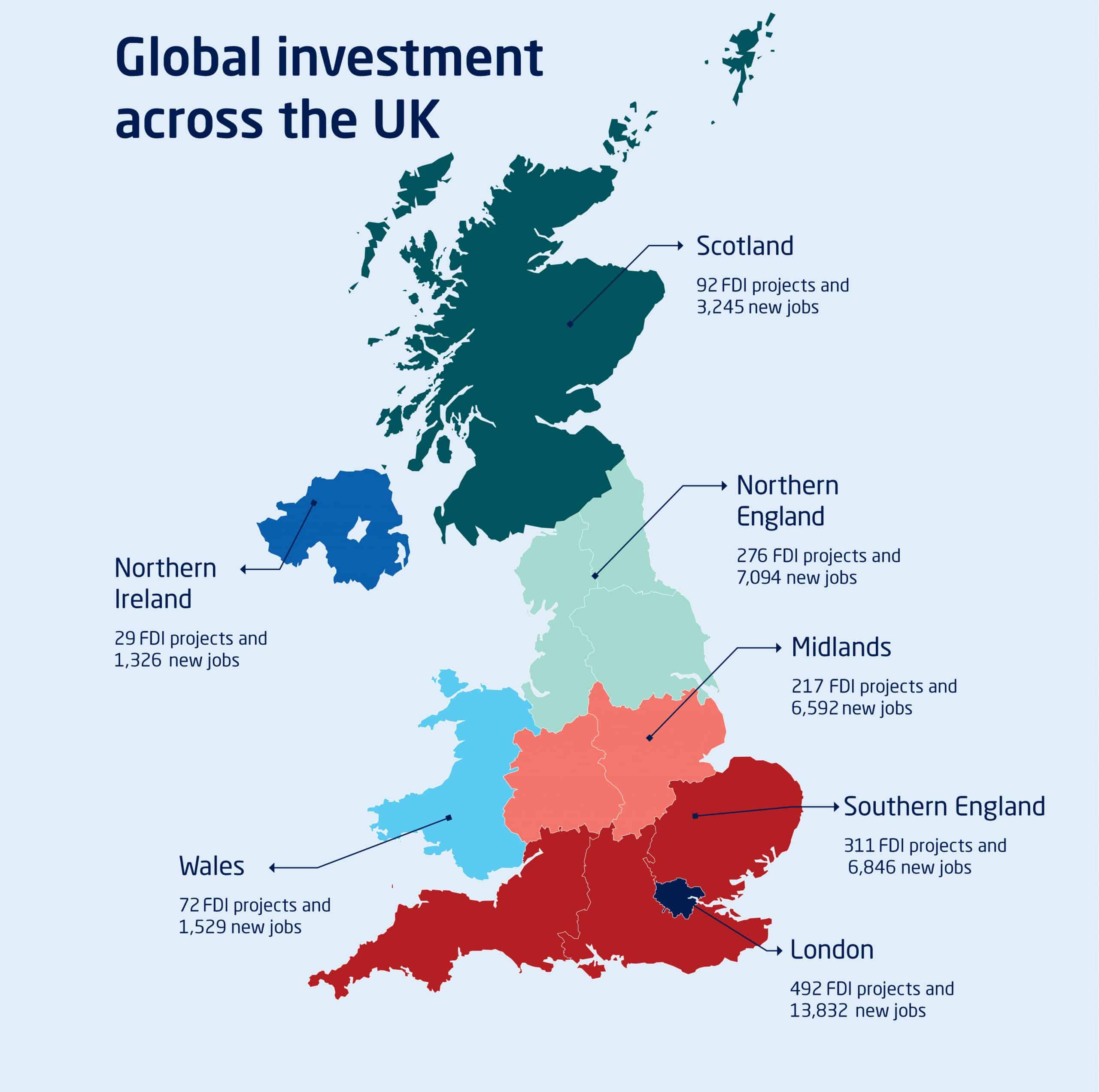
Foreign Direct Investment Trends, 2020
Despite enduring the COVID-19 pandemic like much of the world, the UK successfully maintained its appeal as a global investment destination in 2020. The country ranked second in Europe for total inflow of foreign direct investment (FDI) projects and increased its share of the European FDI market during this period. The UK’s share of FDI in the European market has reached 19.6% – an all-time high since 2015. In 2020, the UK secured 975 projects (down 12% from 2019’s 1,109 projects); while France welcomed 985 projects in the same period (down 18% from 2019’s 1,197 projects). Germany, meanwhile, ranked third, with 930 projects (down 4% from 2019’s 971), and Spain remained a distant fourth with 354 projects (down 27% from 2019’s 486). London also replaced Paris as the most attractive major city for FDI in Europe.
The economic impact of the COVID-19 pandemic, which has created uncertainty around business investment and prompted a re-think of investor priorities, is clearly evidenced in the latest UK FDI figures. The UK attracted USD 19,7 billion in 2020 – a sharp 57% decline from 2019. However, the UK has performed better than the European average, as Europe has experienced an 80% decline in FDI during the same period. For comparison, France has experienced a 47% decrease in inward FDI, while the U.S. experienced a decrease of 49%.

Leading Sectors for Investments
The UK has continued to lead Europe in R&D investments, with 12% more R&D inflows and 62% more life science FDI projects in 2020. The leading sectors for FDI in 2019 were Financial Services, Professional, Scientific and Technical Services; Retail and Wholesale trade; Repair of Motor Vehicles and Motorcycles; Transportation and Storage and Information and Communication. As a result of these projects, 55,319 new jobs were created in the UK. Of these, the majority were in London, followed by Manchester, Belfast and Edinburgh. The most significant growth in FDI, meanwhile, was experienced in sectors such as Digital Technology (62%), Agri-Foods (21%), Pharmaceuticals (16%) and Logistics (14%). Several sectors also experienced sharp declines in terms of FDI inflows, which include: Business Services (-32%), Finance (-20%) and Transportation Manufacturing and Supply (-19%).
- More from ResearchFDI:
Leading Source Countries for FDI in the UK
The US has remained the main source of investment into the UK, generating 31% of the country’s total FDI projects, down from 34% in 2019, but significantly higher than the US’ 22% share of the European market. The UK attracted one out of every four U.S. investment projects in Europe. The United States was followed by Germany, France, Ireland and Japan. The number of projects of European origin in the UK also represented a positive shift from the decline experienced post-2016, with an increase from 340 projects in 2019 to 345 projects in 2020. Conversely, 2020 saw the lowest number of UK outbound investment projects into Europe since 2016, with the 375 projects, representing a 24% fall from 2019’s decade-high 493. Despite the shifts experienced over the last few years, the UK’s economy remains integrated with Europe, while the EU and US remain the most important sources of FDI.
Most investors continue to see the UK as an attractive investment destination thanks to its proximity to markets, availability of skilled labour and potential for domestic market growth.
Strengths
The UK continues to be an attractive investment destination for several reasons. The primary strengths of the UK’s economy in attracting FDI are that it is one of the most liberal in Europe while its business environment is extremely favourable to FDI. According to World Bank 2020 Doing Business Guide, the UK’s business environment ranked 8th globally for its favourability. The ease of launching a business is, for example, a very good indicator: setting up a business takes on average 13 days in the United Kingdom, while the European average is 32 days.
The UK is also an attractive investment destination because of its low unemployment rate. The unemployment rate in the UK in 2020 was 4.3%, significantly lower than the 8.3% unemployment rate experienced across Europe.
The UK is also known for its excellent legal system, skilled workforce, competitive tax regime, and well-regulated economy. The country has a global reputation for innovation and is home to some of the world’s best universities, with state-of-the-art research and development (R&D) capabilities. Moreover, the intellectual property (IP) framework is among the best in the world.
Weaknesses
The UK’s attractiveness as an investment destination has proved resilient amid the COVID-19 pandemic. With that said, the country does has some disadvantages to consider as well:
- Too much contribution of the financial sector to the GDP
- Lack of investment in infrastructure
- An industrial sector that sometimes suffers from the high level of competitiveness and competition from the many foreign companies in the country
- Productivity growth is very low
- High government and household debt (120% of disposable income), high trade deficit
- GDP per capita has stagnated for some years
Support for Investors
The UK offers a wide range of services for investors to facilitate entry into the country. After a company establishes operations in the UK, the Department for International Trade (DIT) offers support in the form of designated “account managers” who can help with expansion and, if necessary, resolve investment environment difficulties. Additionally, through its export lending agency, UK Export Finance, they assist local firms in exporting their products and services to the rest of the world. The DIT also assists investors in navigating the investment climate – DIT provides direct expert assistance to investors on tax, access to financing, banking, research and development (R&D), visas, and skills in the UK business environment. DIT may help identify possible sites for the investor’s company development, particularly when big or complex site location needs exist – DIT can conduct customized site searches and introduce the investor to local government partners. Using the UK’s Investment Support Directory, they may assist overseas investors in finding a partner who meets their specific needs. Finally, they help investors comprehend and take advantage of the UK’s wide range of financial and tax benefits, including the Free Ports initiative.







